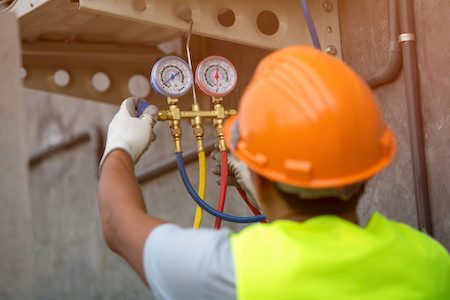
Understanding Your HVAC System’s Energy Consumption
Heating, Ventilation, and Air Conditioning (HVAC) systems are integral to maintaining comfort in homes, but they also account for a significant portion of household energy use. Understanding how these systems consume energy and the factors that affect their efficiency is key to managing your energy bills and ensuring your home’s environmental footprint is as light as possible. This blog aims to demystify HVAC energy consumption and guide homeowners on how to optimize their systems for efficiency.
How HVAC Systems Use Energy
HVAC systems are designed to maintain indoor comfort through heating, cooling, and ventilation. To understand why some systems use more energy than others, it’s important to dive into how they operate and the factors influencing their energy consumption. The primary components that use energy in these systems are:
- Compressors and Fans: In air conditioning systems, the compressor is the most energy-intensive part, responsible for pressurizing the refrigerant to release heat. Fans in both heating and cooling systems also contribute to energy use by circulating conditioned air.
- Heat Exchangers and Burners: In heating systems, particularly furnaces, burners use fuel to generate heat, while heat exchangers transfer this heat to the air circulated throughout the home.
Fundamental Operations of HVAC Systems
- Heating Systems: In heating systems, such as furnaces or boilers, energy is primarily used to generate heat. This can be done through burning fuel (like natural gas, oil, or propane) or by using electrical resistance in the case of electric heaters. The generated heat is then distributed throughout the home, typically through a system of ducts and vents.
- Cooling Systems: Air conditioners, including central air units and heat pumps in cooling mode, operate by extracting heat from the indoor air and releasing it outside. They use a compressor to circulate a refrigerant between the indoor and outdoor units, absorbing heat from the inside and expelling it outside. Fans also play a crucial role in moving warm air over the cooling coils.
Factors Leading to Higher Energy Use in HVAC Systems
Several factors can contribute to higher energy use in HVAC systems:
- Inefficient Components: Older or malfunctioning components, like outdated compressors or failing heat exchangers, can reduce system efficiency, causing the system to use more energy to maintain desired temperatures.
- Lack of Maintenance: Neglecting regular maintenance leads to decreased efficiency. Dirty filters, for instance, restrict airflow, while leaky ductwork can lose a significant amount of heated or cooled air.
- Improper Sizing: An HVAC system that is too large or too small for the space it serves will consume more energy. Oversized systems cycle on and off too frequently, whereas undersized systems run continuously to meet the heating or cooling demand.
- Thermostat Settings: Setting the thermostat to extreme temperatures can cause the system to work harder and consume more energy. Even a few degrees difference from the outside temperature can have a significant impact on energy usage.

How Different Systems Vary in Energy Use
The design and operation of various HVAC systems also influence their energy efficiency:
- Single-Stage vs. Variable-Speed Models: Single-stage HVAC systems operate at full capacity whenever they run, using more energy. In contrast, variable-speed models adjust their output to the current need, improving energy efficiency.
- Heat Pumps vs. Traditional HVAC Systems: Heat pumps are generally more energy-efficient, especially in moderate climates, because they move heat rather than generate it. However, in extremely cold climates, their efficiency can decrease, and supplementary heating systems may be required.
- Energy Efficiency Ratings: Systems with higher SEER (for cooling) and AFUE (for heating) ratings are more energy-efficient. They are designed to use less energy to achieve the same level of temperature control as lower-rated models.
Understanding how HVAC systems use energy is key to identifying ways to reduce consumption and enhance efficiency. Factors like the type of system, its components, maintenance practices, and operation all play a role in how much energy is used. By addressing these factors, homeowners can ensure their systems are running as efficiently as possible, leading to energy savings and prolonged system lifespan. Regular professional maintenance and considering energy-efficient models during upgrades are effective strategies for managing energy use in HVAC systems.
Types of HVAC Systems and Their Energy Profiles
HVAC systems come in various types, each with distinct energy consumption patterns and efficiency profiles. Understanding these differences is crucial for homeowners looking to manage energy costs effectively.
Central Air Conditioners
Central air conditioners are prevalent in many homes and are known for their ability to cool large spaces efficiently. However, their energy consumption can be significant, especially in regions with long, hot summers. The energy efficiency of central air conditioners largely depends on their SEER rating; higher-rated units consume less energy to cool the same amount of space compared to lower-rated models.
Heat Pumps
Heat pumps are versatile systems that provide both heating and cooling. In terms of energy use, they are generally more efficient than traditional HVAC systems because they transfer heat rather than generate it. This is particularly true in milder climates. In colder regions, however, their efficiency can drop, and auxiliary heating systems might be needed, which can increase energy usage.
Furnaces
Furnaces are a common heating solution, particularly in colder climates. They can run on various fuels, including natural gas, oil, or electricity. Gas furnaces tend to be more energy-efficient than oil furnaces, while electric furnaces, though efficient, can be costly to operate due to higher electricity prices. The AFUE rating is a key indicator of a furnace’s efficiency, with higher ratings signifying more efficient fuel use.
Boilers
Boilers, which provide radiant heat, can be powered by natural gas, oil, or electricity. They heat water and circulate it through radiators or underfloor systems. The efficiency of boilers is also measured by the AFUE rating. Modern boilers tend to be more energy-efficient, but their installation and maintenance can be more complex.
Ductless Mini-Split Systems
Ductless mini-split systems are known for their energy efficiency, mainly because they avoid energy losses typically associated with ductwork. They are ideal for heating and cooling specific areas or rooms in a home. These systems are particularly advantageous in homes where extending ductwork is impractical or too costly.

Window Units and Portable Air Conditioners
Window units and portable air conditioners are often used for cooling single rooms. While they can be less energy-efficient overall compared to centralized systems, they can be a cost-effective option for cooling small spaces or for use in moderate climates where extensive cooling is not required.
Geothermal HVAC Systems
Geothermal systems, which utilize the stable temperature of the earth for heating and cooling, are among the most energy-efficient options available. While the upfront installation cost is high, their long-term energy savings and low operational costs can be significant.
Each type of HVAC system has its own set of energy characteristics and efficiency profiles. When selecting a system, it’s important to consider the climate, the size of the space, and the specific heating and cooling needs of your home. Understanding these factors can help homeowners make informed decisions that balance comfort with energy efficiency and cost-effectiveness. Regular maintenance and timely upgrades to more efficient models also play a crucial role in optimizing the energy performance of HVAC systems.
Factors Affecting HVAC Energy Efficiency
The energy efficiency of HVAC systems is influenced by a multitude of factors. These factors can significantly impact how much energy the system uses and, consequently, the overall energy costs for homeowners. Understanding these aspects can help in optimizing HVAC systems for better efficiency and lower energy consumption.
System Age and Technology
Older HVAC systems tend to be less energy-efficient than newer models. Advances in technology have led to the development of systems that use less energy to provide the same level of heating or cooling. Upgrading to a newer, more efficient system can thus result in significant energy savings.
System Size and Capacity
An HVAC system that is too large or too small for the space it needs to condition can be inefficient. An oversized system may cycle on and off too frequently, which can waste energy, whereas an undersized system may have to work harder and run continuously to maintain the desired temperature, leading to higher energy use.
Maintenance and Upkeep
Regular maintenance is vital for keeping an HVAC system running efficiently. Neglected systems can develop problems like dirty filters, leaks in the ductwork, or malfunctioning components, all of which can impair efficiency. Routine check-ups and maintenance can prevent these issues, ensuring the system operates at peak efficiency.
Ductwork and Ventilation
The condition of the ductwork is crucial for HVAC efficiency. Leaky or poorly insulated ducts can result in significant energy losses, as heated or cooled air escapes before reaching its intended destination. Ensuring that ducts are well-sealed and insulated can greatly improve system efficiency.
Thermostat Settings
The settings on the thermostat play a significant role in how much energy the HVAC system uses. Setting the thermostat to extreme temperatures can cause the system to work much harder, increasing energy consumption. Using programmable thermostats to adjust temperatures when the home is unoccupied can lead to energy savings.
Home Insulation and Sealing
The insulation in a home affects HVAC efficiency. Poor insulation leads to heat loss in the winter and heat gain in the summer, making the HVAC system work harder to maintain the desired temperature. Similarly, gaps or leaks around doors and windows can allow air to escape, reducing efficiency.

User Behavior and Preferences
How homeowners use their HVAC system also affects its efficiency. Constantly changing the thermostat settings, for example, can make the system operate less efficiently. Understanding and moderating these behaviors can help in reducing energy consumption.
External Environmental Factors
External factors such as climate, weather patterns, and even the home’s orientation can impact HVAC efficiency. Systems in regions with extreme weather conditions may have to work harder, affecting their efficiency. Strategies like shading or using energy-efficient windows can mitigate some of these effects.
Numerous factors influence the energy efficiency of HVAC systems. By paying attention to these aspects, homeowners can take steps to ensure their systems are as efficient as possible. Regular maintenance, proper sizing, efficient use, and considering environmental factors can all contribute to reducing energy consumption and managing costs effectively. Making informed decisions about HVAC systems and their use is key to achieving a balance between comfort, efficiency, and cost.
High Energy Bills: Exploring Options for Homeowners
For homeowners grappling with high energy bills, particularly those related to HVAC usage, understanding the available options for reducing these costs is crucial. Often, these expenses are directly linked to the efficiency and condition of the HVAC system. Let’s explore the avenues homeowners can take to lower their bills, including updating HVAC systems, necessary repairs, and the importance of ongoing maintenance.
Upgrading to an Energy-Efficient HVAC System
One of the most effective ways to reduce energy bills is by upgrading to a more energy-efficient HVAC system. Modern systems are designed with advanced technologies that consume less energy for heating and cooling.
- Investing in Modern Systems: Newer models of HVAC systems come with higher SEER (Seasonal Energy Efficiency Ratio) and AFUE (Annual Fuel Utilization Efficiency) ratings, indicating better energy efficiency.
- Long-term Savings: Although upgrading involves an initial investment, the long-term savings on energy bills can be substantial. Additionally, modern systems often come with enhanced features like programmable thermostats and improved air filtration, contributing to better indoor air quality and comfort.
Timely Repairs and System Optimization
Sometimes, high energy bills can be a symptom of underlying issues in the existing HVAC system that require attention.
- Identifying and Addressing Repairs: Common issues like refrigerant leaks, malfunctioning thermostats, or faulty compressors can significantly reduce system efficiency. Prompt repairs of these issues can restore efficiency and reduce energy consumption.
- System Optimization: Simple adjustments, like recalibrating the thermostat or cleaning the condenser unit, can also improve system efficiency. A professional HVAC technician can identify and implement these optimizations.
Regular HVAC Maintenance
Regular maintenance is key to keeping an HVAC system running efficiently and avoiding unexpectedly high energy bills.
- Routine Check-ups and Cleaning: Regular servicing, including cleaning air filters, inspecting ductwork for leaks, and ensuring all components are functioning properly, is essential. This not only maintains efficiency but also extends the life of the system.
- Preventive Maintenance Plans: Many HVAC service companies offer preventive maintenance plans, which can be a cost-effective way to ensure your system receives regular, professional maintenance.

Other Energy-Saving Measures
In addition to focusing on the HVAC system, homeowners can implement other measures to reduce overall energy consumption.
- Improving Home Insulation: Enhancing attic insulation, sealing windows and doors, and adding weather stripping can reduce the workload on HVAC systems.
- Smart Thermostats: Installing smart thermostats can offer significant savings by optimizing heating and cooling schedules based on your daily routine and preferences.
High energy bills can often be a sign of an inefficient or malfunctioning HVAC system. By exploring options like system upgrades, timely HVAC repairs, and committing to regular maintenance, homeowners can significantly reduce their energy costs. These measures not only lead to immediate savings but also contribute to the longevity and performance of the HVAC system, ensuring a comfortable home environment throughout the year. Making informed decisions about your HVAC system and its upkeep is an investment in both comfort and cost-efficiency.
Embracing Energy-Efficient Practices
Beyond addressing the HVAC system directly, homeowners can adopt broader energy-efficient practices to further reduce their bills. These practices complement the efforts made in upgrading and maintaining the HVAC system.
Smart Usage Habits
Developing energy-conscious habits can have a significant impact on reducing overall energy consumption.
- Temperature Management: Be mindful of thermostat settings. Keeping temperatures slightly lower in winter and higher in summer can reduce the strain on the HVAC system.
- Zoned Heating and Cooling: If your system allows, use zoned heating and cooling to focus energy use where it’s needed most, avoiding unnecessary heating or cooling of unused spaces.
Utilizing Natural Ventilation and Shading
- Leveraging Natural Air Flow: On milder days, turn off the HVAC system and use natural ventilation. Open windows can help circulate air without using any energy.
- Effective Shading: Use blinds, curtains, and other shading methods to manage indoor temperatures naturally. Shading windows from direct sunlight during hot days can reduce the need for air conditioning.
HVAC System Efficiency: The Role of Technology
Modern technological advancements in HVAC systems can also play a role in reducing energy bills.
- Variable Speed Motors: Systems equipped with variable speed motors adjust their output based on the current need, which can be more energy-efficient than single-speed motors.
- Advanced Compressor Technology: Newer models often feature advanced compressors that provide more precise temperature control and operate more efficiently.
Government Incentives and Rebates
Homeowners should also explore any government incentives or rebates available for upgrading to energy-efficient HVAC systems.
- Tax Credits and Rebates: Many governments offer tax credits, rebates, or other incentives for installing energy-efficient HVAC systems or making energy-efficient home improvements.
- Utility Company Programs: Some local utility companies offer programs or incentives to encourage customers to use energy more efficiently, including upgrading HVAC systems.
Understanding your HVAC system’s energy consumption is essential for making informed decisions about its use and maintenance. By considering the type of system you have, its efficiency ratings, and factors affecting its performance, you can optimize its operation to save on energy costs while maintaining a comfortable home environment. Regular servicing and considering upgrades to more energy-efficient models can also contribute to reduced energy consumption and enhanced home comfort.
COMPARE QUOTES NOW


Leave a Reply